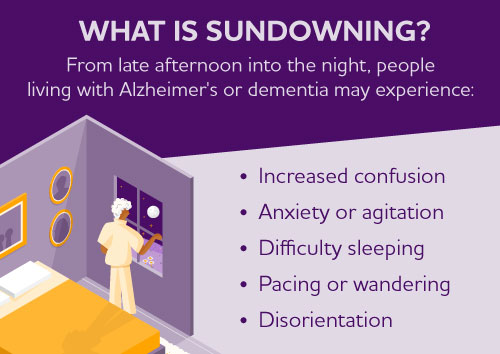
Sundowning is increased confusion that people living with Alzheimer's and dementia may experience from dusk through night. Also called "sundowner's syndrome," it is not a disease but a set of symptoms or dementia-related behaviors that may include difficulty sleeping, anxiety, agitation, hallucinations, pacing and disorientation. Although the exact cause is unknown, sundowning may occur due to disease progression and changes in the brain.
Factors that may contribute to trouble sleeping and sundowning
- Mental and physical exhaustion from a full day of activities.
- Navigating a new or confusing environment.
- A mixed-up "internal body clock." The person living with Alzheimer's may feel tired during the day and awake at night.
- Low lighting can increase shadows, which may cause the person to become confused by what they see. They may experience hallucinations and become more agitated.
- Noticing stress or frustration in those around them may cause the person living with dementia to become stressed as well.
- Dreaming while sleeping can cause disorientation, including confusion about what's a dream and what's real.
- Less need for sleep, which is common among older adults.
Tips that may help manage sleep issues and sundowning
Share your experiences and find support
Join ALZConnected®, a free online community designed for people living with dementia and those who care for them. Post questions about dementia-related issues, offer support, and create public and private groups around specific topics.
Join Now
- Encourage the person living with dementia to get plenty of rest.
- Schedule activities such as doctor appointments, trips and bathing in the morning or early afternoon hours when the person living with dementia is more alert.
- Encourage a regular routine of waking up, eating meals and going to bed.
- When possible, spend time outside in the sunlight during the day.
- Make notes about what happens before sundowning events and try to identify triggers.
- Reduce stimulation during the evening hours. For example, avoid watching TV, doing chores or listening to loud music. These distractions may add to the person’s confusion.
- Offer a larger meal at lunch and keep the evening meal lighter.
- Keep the home well lit in the evening to help reduce the person’s confusion.
- Try to identify activities that are soothing to the person, such as listening to calming music, looking at photographs or watching a favorite movie.
- Take a walk with the person to help reduce their restlessness.
- Talk to the person's doctor about the best times of day for taking medication.
- Try to limit daytime naps if the person has trouble sleeping at night.
- Reduce or avoid alcohol, caffeine and nicotine, which can all affect the ability to sleep.
- If these suggestions do not help, discuss the situation with the person's doctor.
Talk to a doctor about sleep issues
Discuss sleep problems with a doctor to help identify causes and possible solutions. Physical ailments, such as urinary tract infections or incontinence problems, restless leg syndrome or sleep apnea, can cause or worsen sleep problems. For sleep issues primarily due to Alzheimer's disease, most experts encourage the use of non-drug measures rather than medication. In some cases when non-drug approaches fail, medication may be prescribed for agitation during the late afternoon and evening hours. Work with the doctor to learn the risks and benefits of medication before making a decision.
If the person is awake and upset
- Approach them in a calm manner.
- Find out if there is something they need.
- Gently remind them of the time.
- Avoid arguing.
- Offer reassurance that everything is all right.
- Don't use physical restraint. Allow the person to pace back and forth, as needed, with supervision.